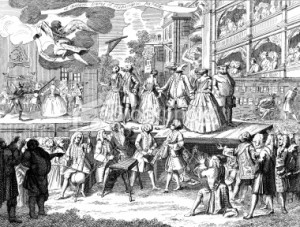18806. (Steven Muhlberger) Deeds of Arms ― Formal Combats in the Late Fourteenth Century
18807. (Richard A. Schweder, Manamohan Mahapatra, & Joan G. Miller) Culture and Moral
. . . . . Development [article]
18808. (John Lewis Gaddis) The Landscape of History ― How Historians Map the Past Read more »
Category Archives: BQ - Reading 2010 - Page 2
READING – JUNE 2010
18806. (Steven Muhlberger) Deeds of Arms ― Formal Combats in the Late Fourteenth Century
Steve has outdone himself with this parvum opus. It’s an exemplary work of focused history, with everything there in the right quantities and proportions. Medieval western Europe was a military society in which tournaments — group or single combat done by rules and for the display of prowess — had a profound significance, affecting far more than their immediate participants. Success in deeds of arms could bring more than mere celebrity. In a society where aristocracy justified itself primarily by courage in battle, it was the key to upward mobility and power. Learning how this kind of combat nullo interveniente odio (without rancor) was done and celebrated gives us insight into how medieval society worked. The Middle Ages, especially its upper reaches of power, smelled of blood, sweat, dung and horses. This book is a fine antidote to those that retrofit the era with a kind of abstract geopolitical aura, something like an EU Barosso Comission report delivered by board members unaccountably wearing hose and plate armor. Those who have only a passing interest in chivalry or deeds of arms will find this book refreshingly compact, clear and informative. Those with a deeper interest will not find it wanting in depth of scholarship and understanding.
READING – MAY 2010
18771. [2] (Mark Twain) Tom Sawyer
18772. (Osbert Sitwell) Introduction to Five Novels by Ronald Firbank
18773. (Francis Grose) Ordinances of Richard II from Military antiquities [tr. Will McLean] Read more »
READING – APRIL 2010
18696. (Steven Muhlberger) Jousts and Tournaments ― Charny and the Rules for Chivalric
. . . . . Sport in Fourteenth-Century France
18697. (Geoffroi de Charny) Demands pour la joute, le tournoi, et la guerre [manuscripts
. . . . . edited by Michael Anthony Taylor, tr. Steven Muhlberger]
18698. (C. William Harrison) Calling Dr. Death [story] Read more »
Jousts and Tournaments
18696. (Steven Muhlberger) Jousts and Tournaments ― Charny and the Rules for Chivalric Sport in Fourteenth-Century France
18697. (Geoffroi de Charny) Demands pour la joute, le tournoi, et la guerre [manuscripts edited by Michael Anthony Taylor, tr. Steven Muhlberger]
Rather than bug Steve for a copy, I put myself on a library waiting list for his study of the rules of jousts and tournaments of the Middle Ages. I was on the list for over a year, before it turned up, which shows that there is a significant audience for what appears, at first, to be an obscure topic. But I can see why, as the subject is dealt with in a logical, orderly fashion, and in his usual fine prose style. I particularly enjoyed the chapter in which he draws on his knowledge of the modern horsemanship scene to help imagine what the spotty historical record does not tell us. The original text of Geoffroi de Charny’s “Questions” in Middle French is included, with a translation by Steve.
READING – MARCH 2010
18642. (P. F. de Moraes Farias) Arabic Medieval Inscriptions from the Republic of Mali: Epigraphy,
. . . . . Chronicles, and Songhai-Tuāreg History
18643. (Jacques Hureiki) Essai sur les origines des Touaregs ― herméneutique culturelle des
. . . . . Touaregs de la région de Tombouctou
18644. (Anthony Bourdain) Kitchen Confidential Read more »
Sunday, March 28, 2010 — A Lay of Ancient Toronto, Part 2
When I received Dorothea’s book [see previous blog entry] from the University of Toronto’s compact storage facility.[1] I was rewarded in a way that I could not have guessed. In fact, the coincidence involved is so extreme that I hesitate to relate it, for fear of being thought a hoaxer. Read more »
18672. [2] (William Tenn) Of Men and Monsters
William Tenn was one of Science Fiction’s sharpest satirists in the fifties and sixties. His short stories bit like blackflies. Of Men and Monsters was one of his only two novels, and it was expanded from a short story. It shows it, as the core story is still visible, and the end shows a distinct falling off in quality, with the satire disappearing so that there can be a conventional, plot-driven resolution. But never mind that. SF writers in that period had no social prestige, and very modest incomes; it was standard practice to inflate any successful short story into a “novel” that might pay the rent. But Tenn’s talent lay in beautiful, self-contained miniatures that did not lend themselves to expansion. Read more »
Sunday, March 14, 2010 — A Lay of Ancient Toronto, Part 1
Steve Muhlberger has been more prolific in his blog, lately, and it has featured some fine pieces on the psychology of historians. Entries such as “Is the past another country?” among many, are well worth reading. I’m reminded of them when I re-shelve a nice little book that I recently found in a second-hand shop ― an 1882 edition of Macaulay’s Lays of Ancient Rome. It’s just the sort of thing that delights anyone who is fascinated by the past. It’s inscribed twice by early owners. The first inscription reads: “Dorothea Thorpe, from Hughey Jnr., March 20, 1884″ The second reads: “Lavinia Mary Ford, from Dorothea’s Husband and in memory of her. Charnwood 18th October 1934, St. Luke’s Day”. These excite the historical imagination in me. Read more »
The Beggar’s Opera

The Beggar’s Opera is a pointed example of unpretentious popular art long outliving the “serious” works of its day. In 1728, a rather unsuccessful English poet, John Gay, penned a satire of the upper class’s taste for Italian Opera, as well as the establishment politics of the day (then personified in First Lord of the Treasury, Robert Walpole). Using a kleptomaniac collection of Scottish and French folk-tunes, Gay conceived a fast-moving, tight-knit plot involving, instead of the usual operatic cast of Classical heroes and deities, the whores and thieves of the London slums. Read more »
